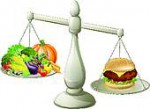I’ve always liked a good egg, especially a perfectly executed fluffy omelet oreggs with my southern biscuits. But like many Americans, I am concerned about my cholesterol. So for years I’ve limited my consumption of eggs since we were told by the Nutrition gods that eggs were bad for your cholesterol.
The gods got it wrong. After receiving a life sentence for being an accomplice to the “silent killer” (a.k.a. high cholesterol) leading to moreheart attacks and strokes, eggs have been pardoned.So has shellfish. The folks over at Red Lobster must be celebrating. I’m ready to boil up some shrimp and crawfish.
The “Jury” in this case isthe U.S. Dietary Guidelines Advisory Committeewhich recently released its five year report to the U.S. Department of Agriculture (USDA) and Health and Human Services (HHS). The report includes updated recommendations to help federal officials decide the 2015 U.S. Dietary Guidelines for Americans. The final report will be released later this year.
What’s the point? Here’s why it matters from the website
The Dietary Guidelines for Americans (Dietary Guidelines) provides advice for making food and physical activity choices that promote good health, a healthy weight, and help prevent disease for Americans ages 2 years and over, including Americans at increased risk of chronic disease. The recommendations are based on a rigorous review of relevant scientific evidence that occurs through a transparent process. The Dietary Guidelines serves as the cornerstone for all federal nutrition education and program activities.
Read more here:http://health.gov/dietaryguidelines/2015.com
Aswith any major proceeding there’s a debate period. In this case, a 45 day open forum which started February 19th, where nutrition and health experts, food producers, commodity groups and just about anyone else with an opinion can weigh in.
 Pardoned: Eggs and shellfish. The incredible edible egg makes a comeback! When I was a young girl, the grapefruit and hard boiled egg “flight attendant” diet was all the rage. Then we were informed eggs contained too much cholesterol and were “bad” for you. Now they are OK again. It’s like fringe and wedge heels; they’re back in fashion. At least for now and until the Jury of Nutrition gods reconvenes to reconsider everything again in 2020. Tip: Look for antibiotic free, cage free eggs.
Pardoned: Eggs and shellfish. The incredible edible egg makes a comeback! When I was a young girl, the grapefruit and hard boiled egg “flight attendant” diet was all the rage. Then we were informed eggs contained too much cholesterol and were “bad” for you. Now they are OK again. It’s like fringe and wedge heels; they’re back in fashion. At least for now and until the Jury of Nutrition gods reconvenes to reconsider everything again in 2020. Tip: Look for antibiotic free, cage free eggs.
 Probationed: Coffee. If consumed in moderation (3-5 cups a day or up to 400 mg) coffee could reduce your risk of heart disease and diabetes. But hold the lattes and cappuccinos; we’re talking black coffee with no cream and sugar. If the caffeine in coffee makes you jittery, or if you take medications that may be affected by caffeine, 3 to 5 cups a day is not for you. The report also does not recommend mixing highly caffeinated beverages and alcohol: Quote: “Energy drinks with high levels of caffeine and alcoholic beverages should not be consumed together, either mixed together or consumed at the same sitting.” I get it for the Red Bull and vodka combo, but what does it mean for an Irish Coffee? Tip: Go for a small cup of espresso rather than a giant cup of coffee for less caffeine.
Probationed: Coffee. If consumed in moderation (3-5 cups a day or up to 400 mg) coffee could reduce your risk of heart disease and diabetes. But hold the lattes and cappuccinos; we’re talking black coffee with no cream and sugar. If the caffeine in coffee makes you jittery, or if you take medications that may be affected by caffeine, 3 to 5 cups a day is not for you. The report also does not recommend mixing highly caffeinated beverages and alcohol: Quote: “Energy drinks with high levels of caffeine and alcoholic beverages should not be consumed together, either mixed together or consumed at the same sitting.” I get it for the Red Bull and vodka combo, but what does it mean for an Irish Coffee? Tip: Go for a small cup of espresso rather than a giant cup of coffee for less caffeine.
 Limited Power of Consumption: Alcohol. Moderateconsumption of alcohol in adults can be part of a healthy diet. That means one 8 oz. glass of wine a day for women, not one bottle, my drinking pals and healthy husband. I’ll drink to that! But, if you are breast feeding, taking medications or concerned about increasing your risk of breast cancer, think twice about that first glass and be honest about your alcohol consumption with your medical practitioners. Tip: Sip, don’t gulp,two smaller 4 oz. glasses of wine versus one 8 oz glass if you want to try and taste more.
Limited Power of Consumption: Alcohol. Moderateconsumption of alcohol in adults can be part of a healthy diet. That means one 8 oz. glass of wine a day for women, not one bottle, my drinking pals and healthy husband. I’ll drink to that! But, if you are breast feeding, taking medications or concerned about increasing your risk of breast cancer, think twice about that first glass and be honest about your alcohol consumption with your medical practitioners. Tip: Sip, don’t gulp,two smaller 4 oz. glasses of wine versus one 8 oz glass if you want to try and taste more.
 Jilted: The steady companions to eggs: bacon, ham, sausage, breakfast steak and any processed meats. Basically saturated fat, which predominately comes from animal protein, got the shaft. That has set the beef and pork commodities folks growling and squealing. “It appears the advisory committee was more interested in addressing what’s trendy among foodies than providing science-based advice for the average American’s diet,” said Howard Hill, a veterinarian and president of the National Pork Producers Council. My observation: Veterinarians specialize in animal nutrition not human nutrition. Stick a fork in it, Mr. Pork.
Jilted: The steady companions to eggs: bacon, ham, sausage, breakfast steak and any processed meats. Basically saturated fat, which predominately comes from animal protein, got the shaft. That has set the beef and pork commodities folks growling and squealing. “It appears the advisory committee was more interested in addressing what’s trendy among foodies than providing science-based advice for the average American’s diet,” said Howard Hill, a veterinarian and president of the National Pork Producers Council. My observation: Veterinarians specialize in animal nutrition not human nutrition. Stick a fork in it, Mr. Pork.
 Sentenced to Life Behind Closed Jars and Bars: Sugar. The recommendation is Americans should consume no more than 10 percent of their daily calories from sugar, roughly 12 teaspoons a day. Currently we’re averaging 22 to 30 teaspoons a day, much of which comes from sugary drinks (sodas, juices) and hidden sugars in packaged and processed foods. Yes, many of us have become cookie monsters and sugar sharks which can lead to obesity and diabetes. Tip: You want sugar? Eat more fresh fruit. Or enjoy that residual sugar in your daily glass of wine.
Sentenced to Life Behind Closed Jars and Bars: Sugar. The recommendation is Americans should consume no more than 10 percent of their daily calories from sugar, roughly 12 teaspoons a day. Currently we’re averaging 22 to 30 teaspoons a day, much of which comes from sugary drinks (sodas, juices) and hidden sugars in packaged and processed foods. Yes, many of us have become cookie monsters and sugar sharks which can lead to obesity and diabetes. Tip: You want sugar? Eat more fresh fruit. Or enjoy that residual sugar in your daily glass of wine.
 Verdict Upheld: Vegetables and a plant-based diet. Contrary to the remarks made by the aforementioned Pork Council President/Veterinarian Mr Howard Hill adding more vegetables into your diet is not “trendy.” It’s healthy. Tip: Switch salty, carb-loaded chips for slices and spears of vegetables with your snack dip. Mix chopped veggies and nuts into your yogurt for a healthy breakfastor savory snack.
Verdict Upheld: Vegetables and a plant-based diet. Contrary to the remarks made by the aforementioned Pork Council President/Veterinarian Mr Howard Hill adding more vegetables into your diet is not “trendy.” It’s healthy. Tip: Switch salty, carb-loaded chips for slices and spears of vegetables with your snack dip. Mix chopped veggies and nuts into your yogurt for a healthy breakfastor savory snack.
The policy of a balanced, healthier and environmentally sustainable diet these days is really simple veganomics (I wish I made up that term but I didn’t): more plant protein; less animal protein, healthier fats, leaner cuts, real food, not fake stuff.
Here’s a brief excerpt from the executive summary:
The overall body of evidence examined by the 2015 DGAC identifies that a healthy dietary pattern is higher in vegetables, fruits, whole grains, low- or non-fat dairy, seafood, legumes, and nuts; moderate in alcohol (among adults); lower in red and processed meat;and low in sugar-sweetened foods and drinks and refined grains. Vegetables and fruit are the only characteristics of the diet that were consistently identified in every conclusion statement across the health outcomes.
It’s also more sustainable:
The major findings regarding sustainable diets were that a diet higher in plant-based foods, such as vegetables, fruits, whole grains, legumes, nuts, and seeds, and lower in calories and animal-based foods is more health promoting and is associated with less environmental impact than is the current U.S. diet.
But wait…..there’s more…. say the Guidelines: A Healthy Diet is not only about what you eat. It is also what you exert. Move away from the screen and get outside in the scenery. If we’re all so conscious about having a healthier environment, get outside and enjoy it while you can. The steady weight gain we see in both children and adults has as much to do about how much time we spend hunching over a computer than what we are mindlessly munching.
Bottom line: Eat to live well and live to eat well. Love food that loves you back. Be choosy by selecting better food when you can and choose not to eat artificial, processed food that does nothing for the bottom line of your health or body but does everything for the bottom line of the corporation that manufactures it.
What works for you nutritionally may not be what works for someone else. If your body needs a little meat and dairy, consume it, just don’t inhale it in large quantities. Enjoy what you love in moderation. My Plate may not be Your Plate, but let’s all share more meals around a table with friends and family rather than over a keyboard or racing between appointments.
 Of course, in five more years this may all change again…. like fashion. Who knows what tomorrow will bring when it comes to what we may be eating or not eating?Will dairy make a comeback. Will grains have more gains? Will we still be eating more like cavemen, rabbits or dairy maids? Will the food pyramid turn into a leaning tower of pizza or a bowl of guidelines mumbo gumbo? What will the future of our food be?
Of course, in five more years this may all change again…. like fashion. Who knows what tomorrow will bring when it comes to what we may be eating or not eating?Will dairy make a comeback. Will grains have more gains? Will we still be eating more like cavemen, rabbits or dairy maids? Will the food pyramid turn into a leaning tower of pizza or a bowl of guidelines mumbo gumbo? What will the future of our food be?
From your lips to the nutrition gods ears…..
Want to weigh in or read more? Visit:http://www.health.gov/dietaryguidelines/committee/
 Hear from a nutrition expert on this topic. Registered Dietitian Carolyn O’Neil joins me on Fearless Fabulous You! Mon., Feb 23, 9pm to chew the fat on the new U.S. Dietary Guidelines. Tune in live: W4WN.com or listen later on iHeart.com
Hear from a nutrition expert on this topic. Registered Dietitian Carolyn O’Neil joins me on Fearless Fabulous You! Mon., Feb 23, 9pm to chew the fat on the new U.S. Dietary Guidelines. Tune in live: W4WN.com or listen later on iHeart.com
Following Carolyn is Social Worker Stephanie Erickson, a specialist on helping families address decisions on caring for elderly parents.









